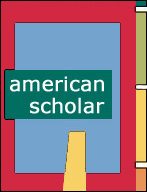English 5522 - Literary Theory and Criticism
Does Literature Have To Mean Something Substantial?
I have given much thought to my explorations over the past several days and how they will translate as an accumulative body of my labor at the end of the semester. I have become interested in what our theoreticians consider to be the overall function of art, especially in its literary form, and how this function is properly carried out. It seems that Geoffrey of Vinsauf gives at least four uses of literature, especially as poetry, in his Poetria Nova. The problem I am having is that one of the functions doesn't seem to be mandatory.
I appreciated the sensible nature of his advice for the aspiring poet. Just as Horace seemed to skim just above the surface of the tangible in terms of practicality where art is concerned, Geoffrey gave nuts-and-bolts guidance that made sense to me personally. How much more practical can you get than "home improvement"? His introduction had Tim Taylor written all over it. Here, by using the analogy of home construction, Geoffrey gives both the first function of literature and the function of the writer of literature. According to the Leitch in his introduction, Geoffrey considers the poet as "an architect" (228). The architect draws carefully thought-out plans for an edifice that will benefit him-that will serve him. Therefore, the function of the poet is to act as creator, right? I think Geoffrey is saying the poem itself comes after much mental sculpting, and once its form is thoroughly envisioned, it comes forth by the initiative and skill of the poet. Therefore, the function of his creation, according to Geoffrey, is "to serve" (229). This seems like a worthy function.
The second use of literature is tacit in the section on amplification. Geoffrey explains how the poet is able to stretch the overall effect of his point by the use of indirect language. He advises, "Do not unveil the thing fully but suggest it by hints" (232). He makes a good point. So couldn't he infer that one of the functions of literature is to exercise the intellect, to provoke profound thought within the reader? This seems like a worthy function.
I extracted another function of literature from Geoffrey's comments on apostrophe. Here, he likens the poetry to a succulent feast. If with the use of apostrophe, "the courses of an excellent cuisine are multiplied," then the poetry is meant to please its audience. (233). This seems like a worthy function.
Geoffrey gives so many rich examples of ornamental language in his treatise. On the other hand, we are now in a century when such phrases as "fear grows pale, anger flushes, and pride swells" have been over-used. Still, it is worth the poet's attention to adhere to the principles of Geoffrey's advice. He is careful to stress the importance of ornamenting only those thoughts that are worth ornamenting. Otherwise, you have meaninglessness adorned in pretty colors. He advises the poet to examine the words he plans to use in relation to what they mean (236). If there is dignified meaning, then that meaning must be expressed as such. So Geoffrey is saying that the function of the artist's creation must be to speak meaning, and to speak it in an honorable manner. The final words of the excerpt of his Poetria Nova seem to echo this notion, when he challenges the poet to "let [his words'] meaning confer a juicy savor [. . .], and let them arrive succulent and rare" (240). But how far do we take this notion of meaning? Is it suitable to write something that will mean nothing in the future?
